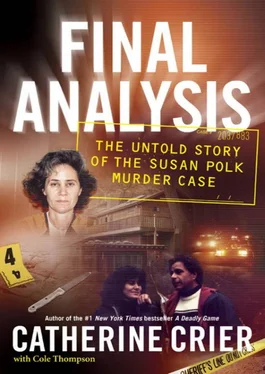“And then, um, he was going after the knife and I stabbed him in the side, and then he was leaning over, and I think at that point he punched me in the face again, and I reached around and I stabbed him in the back, and then he bit into my hand and bit down as hard as he could. There’s actually teeth, tooth marks on both sides [of my hand] and then he went for the knife at the same time.
“And I thought, well, he was doing what I did and if I loosen up now, he’s going to get it and kill me. And so then I stabbed him again.”
At one point, Susan remembered clenching the knife in both hands and repeatedly slashing at her husband. “Stop, stop, stop, stop, stop!” she screamed, waving the blade from side to side to keep him at bay before driving it into his torso. “Get off! Get off! Get off! Get off!”
“I opened my eyes, and I saw blood, and I thought that I had torn open his chest, but I think I would have seen some blood from the previous stabbing.”
Susan described watching as Felix staggered to his feet and mumbled his final words. “I stood up and dropped the knife, and Felix just said, ‘Oh my God. I think I’m dead.’ And he wobbled back and forth like this,” Susan said, rocking back and forth to mimic Felix’s movements. “Like swayed, and then he just fell back and hit his head on the floor.”
Continuing, Susan described how the pounding of her temples was deafening as she worked to catch her breath. She needed to sit down. Striding to the short flight of stairs leading to the single bedroom, she perched on a step near to where Felix lay on the floor. The room was in a shambles. Blood was everywhere. Staring down at her husband, Susan said that scenes of their life together came rushing back. For one brief moment, she remembered the good times and the love they once shared. But those thoughts quickly disappeared.
It is not clear if Felix was dead at that moment. Susan admitted that she did not check for a pulse. Prosecutors would later insist that Felix was, in fact, alive and still breathing for nearly thirty minutes after the attack. They even suggested that Susan left her husband of twenty years to die alone when she returned to the main house some time later that evening.
Susan described how she crossed the room to the bathroom at the top of the landing to wash up. Her hands were covered with blood and she wanted to wash the pepper spray out of her eyes. The pool house had not been updated since it was first built in the 1960s. The tiny bathroom, reminiscent of a ship’s head in size and shape, still had the original wood paneling and pull chain toilet. Turning on the faucet, Susan watched as rivulets of red streamed into the sink. It was clear she was not thinking of the consequences when she pulled the pair of blue towels from the towel bar, dried off her hands, and dropped the towels in a heap on the floor in front of the stall shower.
“When I came back, he was dead,” Susan related.
“Do you remember what you thought at that point?” I asked.
“Yes, I thought a number of things. I thought I should call the police. I thought that I had just written this letter accusing the juvenile judge of taking a bribe and I sent it on the way back from Montana to six or seven judges in our county, and I thought, I’m in big trouble.
“Because even if they believed me, which Felix had said nobody will ever believe me about anything, even if they did, they’re not gonna maybe care. And I’d just seen what had happened to Eli in the juvenile justice system, and I thought, ‘Who’s going to take care of Gabriel? Who’s going to get him to school? Who’s going to pay the mortgage? Oh my God!’
“And I waited, thinking the police would magically appear, that they’d heard me scream, they’d know, they’d come, and then it just became easier to just wait. And I just thought, ‘I need time. I need time to tell Gabriel what happened. I need time to make some financial arrangements for the kids. I should call a lawyer.’
“Just, you know, I just put it off. So I went to the [main] house, and I just took about ten showers and took Gabriel to school in the morning and um, was just too tired to do anything. You know, too tired to make any financial arrangements, any plans, and then just tried to get up enough nerve to tell Gabriel and hinted around and…”
“Do you remember what you said as a hint?” I asked.
“Well, he was asking me, and I was just trying to tell him. I don’t remember exactly. I said he [Felix] was gone. I mean we were always so connected. And then he accused me. Straight up. And um, then it was just, um, he could call the police, and um, the police came and that was that.”
“Was your mind working at the time? Were you thinking about denying? Is that a function of buying time?”
“I’d just been accused by Gabriel, it was just, um, I wanted to tell him what had happened, you know, and then all of a sudden he’s accusing me, you know, he’s jumping ahead. He’s making these accusations. And I just didn’t want to be seen in his eyes that way, and I just began to lie, and then there was the whole thing, seeing him, I still wasn’t sure that I was going to lie until I was in the car, and I saw him in custody—he was in the car behind me, and I was told he was being detained.
“I had this thought that I had to do everything I could to keep him and me out of custody so I could protect him. And then I thought, well if they accused him, then I’d have to step forward immediately and say I did it, and so I had to keep track of what’s going on here, and I mean, I think a person who is that fatigued and in shock and that terrified is just not logical.”
It was then that Susan went on to describe how she first admitted her role in Felix’s death five days after the struggle in the guest cottage to the lawyer who came to see her at the West County Detention Facility. She also insisted that in the months after Felix’s death, she repeatedly tried to turn over the knife used in the attack to her defense lawyers but they had declined to give it to police.
“Listen, I tried to turn it over to every single attorney I had from day one,” she said. “As soon as I found myself charged with murder I was like ‘oh my God.’ So I told them what happened. Nobody wanted to hear, nobody wanted to handle it.
“Seven months later, I was offered a deal—I said, ‘No, I’m innocent.’”
Finally, in April 2005, while out on bail, Susan said she went back to the house with Peter Coleridge, who at that point was still her defense attorney. While there, she pulled out the knife and told him that she wanted to place it into evidence.
“And he’s like, ‘oh, you shouldn’t have done that,’ and I’m like, ‘why not?’ and he was like, ‘well now I’ve got to turn it in.’”
Despite this dramatic recounting replete with extraordinary detail, elements of Susan’s version of events that night would later prove doubtful—particularly those pertaining to the ottoman. Because Susan had waited until late 2004 to inform the authorities about the pepper spray, there was no longer sufficient evidence to verify her claim that any chemical residue should be on the ottoman. According to an official lab report, tests for traces of mace or pepper spray performed on the ottoman in March 2005 proved inconclusive. “Due to the length of time elapsed before sampling, it cannot be determined if they were ever present or if they have changed to become undetectable.” In addition, “the ottoman was not packaged in an airtight container” and “some experimentation in the laboratory suggested it was unlikely to be able to recover spray residues after long-term storage.”
Susan’s tale of that night was not the only thing that she had in store for me that afternoon. With help from Dan Horowitz and Ivan Golde, Susan had obtained a startling medical report from the U.S. Navy that detailed the psychological evaluations of Felix in the days after his suicide attempt in 1955. Sitting across from me and staring through an inch and a half of Plexiglas, I asked her: “Why was Felix hospitalized for a whole year after his suicide attempt?”
Читать дальше











